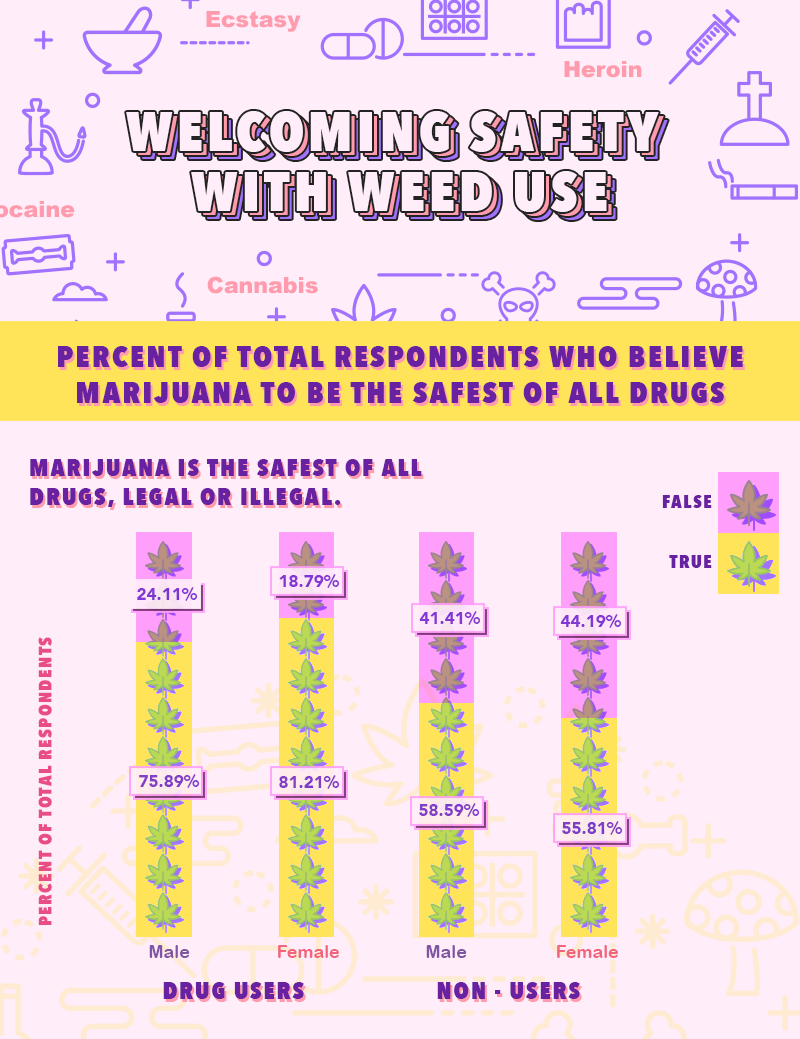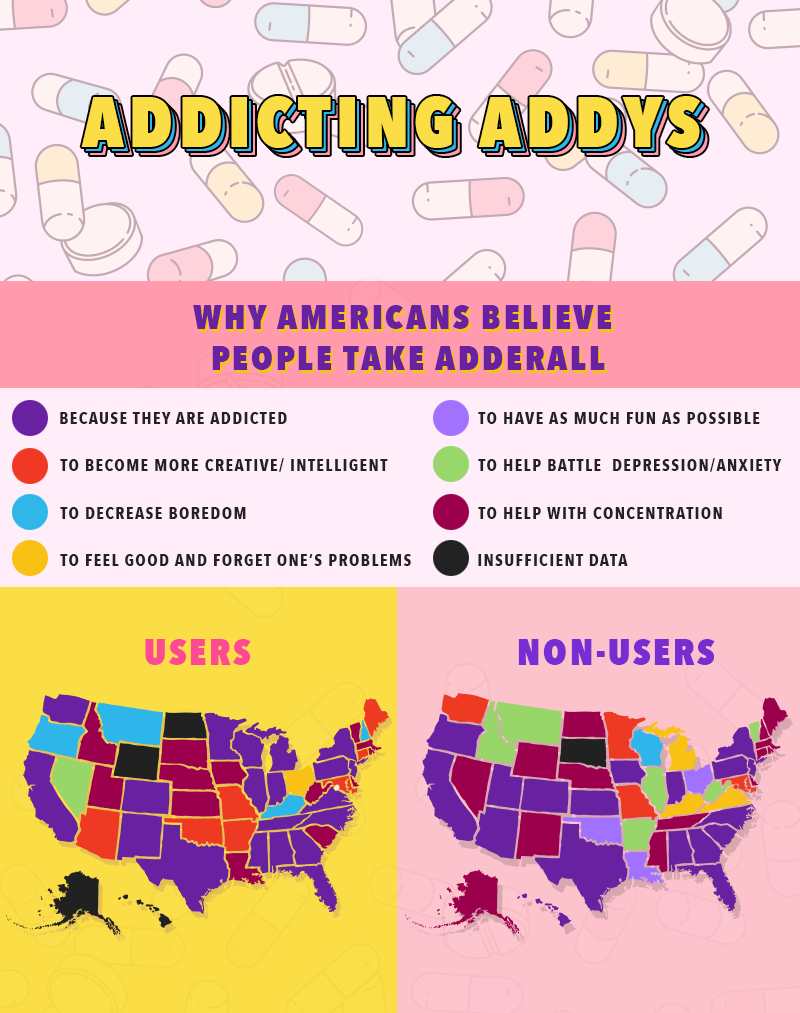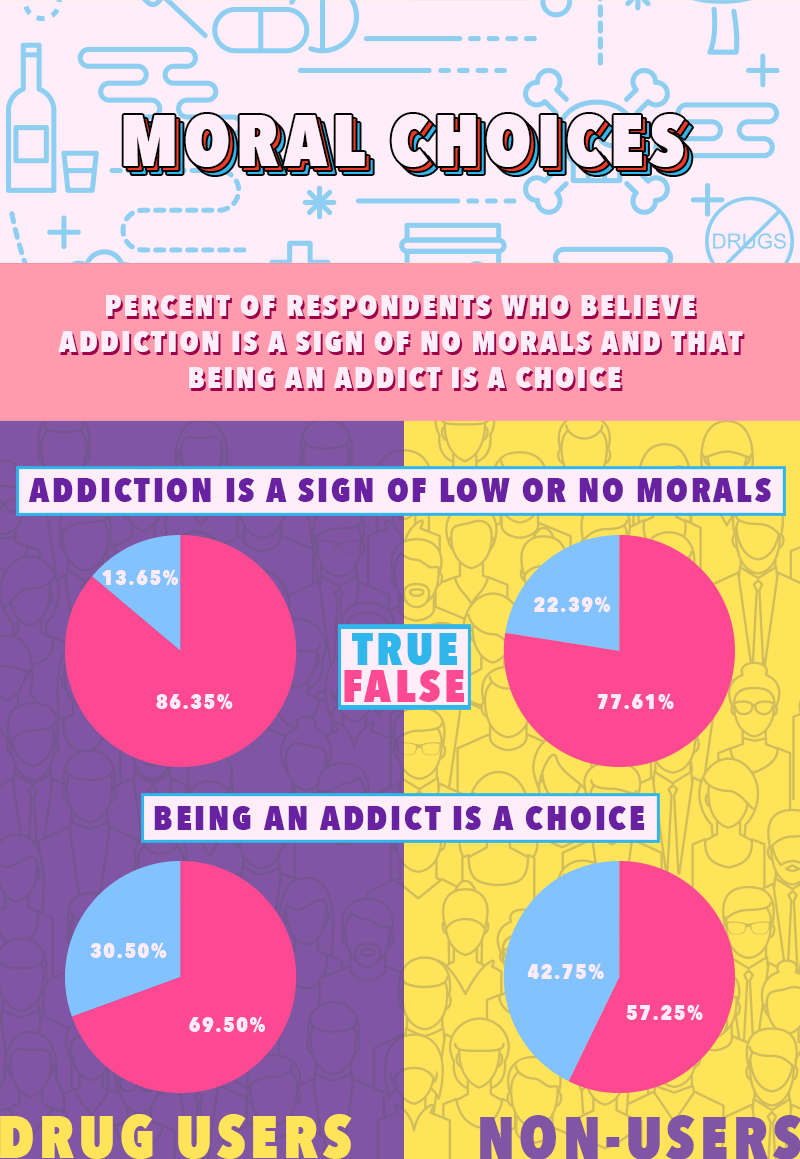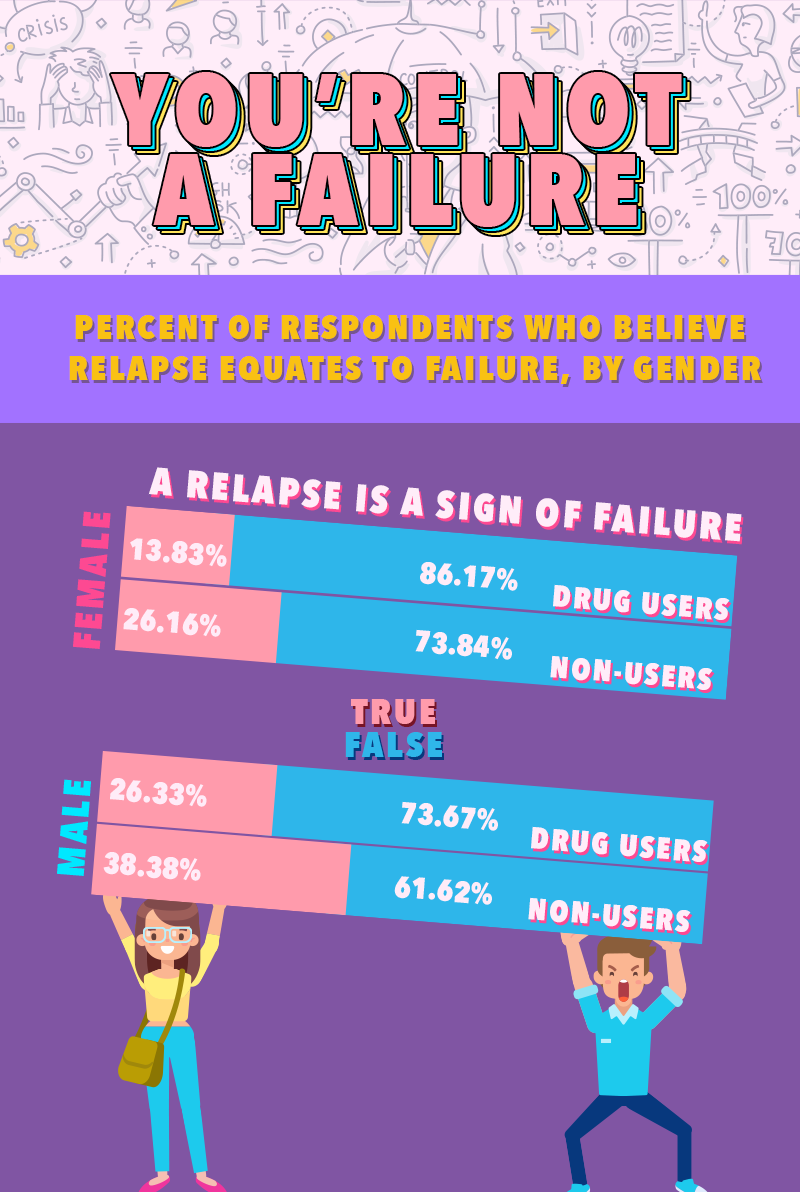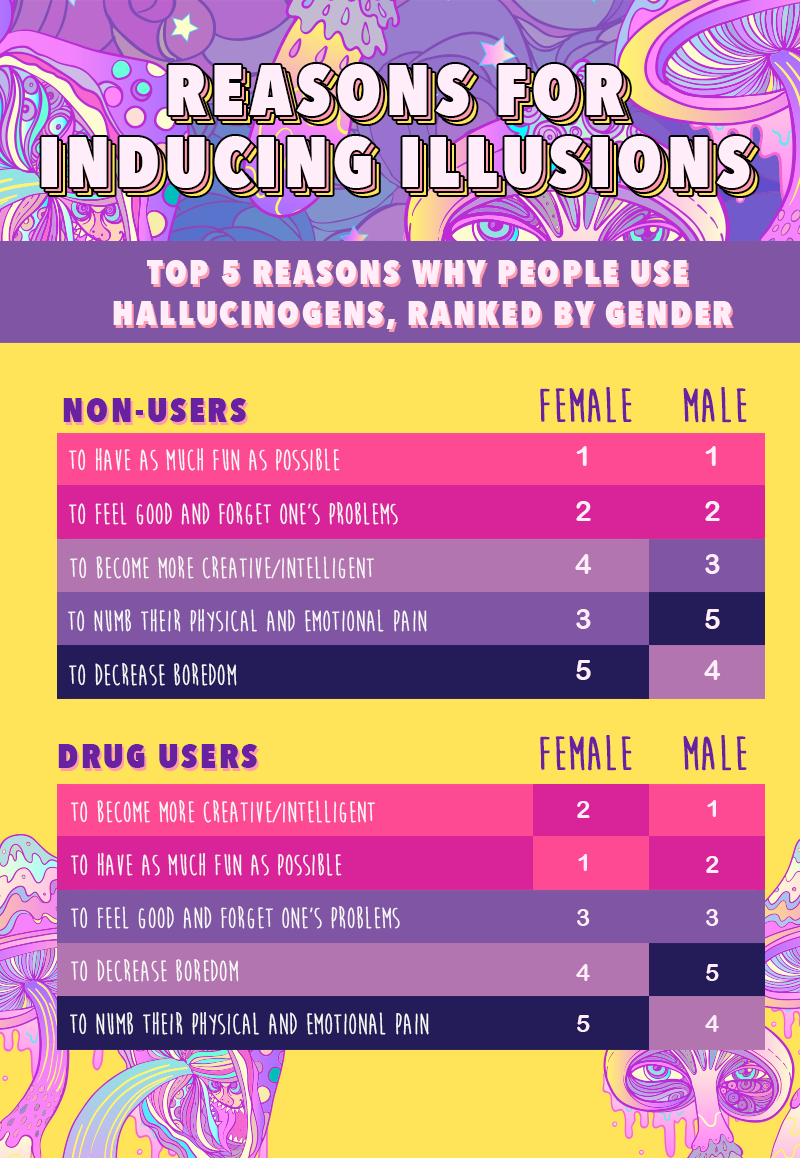
Are you sure back alleys and parking lots are where people score cocaine? Do men or women judge people more for relapsing back into drug use? Why do you think people take Adderall, and does everyone else agree with your assessment?
You may have beliefs about what you think substance use looks like across America, even down to personal opinions on different types of drugs. We polled over 1,100 Americans, split between non-users and drug users, to see if their thoughts on drug addiction were at odds or in sync with each other. Read on to see what’s really on people’s minds when it comes to drug use across the country.
Thoughts on Drug Addiction: Hazy Feelings
Substance users feel marijuana is significantly safer than any legal or illegal drug, and definitely more than their non-user counterparts. For those who are drug users, marijuana was deemed extremely safe: approximately 76 percent of males and 81 percent of females. When it comes to a non-drug user, over half of both men and women felt it was safe, but not as overwhelming as their substance-using counterparts.
Even though weed may be regarded as a natural product, that doesn’t mean there aren’t dangerous consequences associated with regular consumption. Another issue that has become a safety concern is the lack of federal testing by the Food and Drug Administration; which means as states legalize, there is a missing framework for how to regulate and enforce safety standards. Pesticides, mycotoxins, mold, and fungus could all be concerns if the original plants weren’t tended to appropriately.
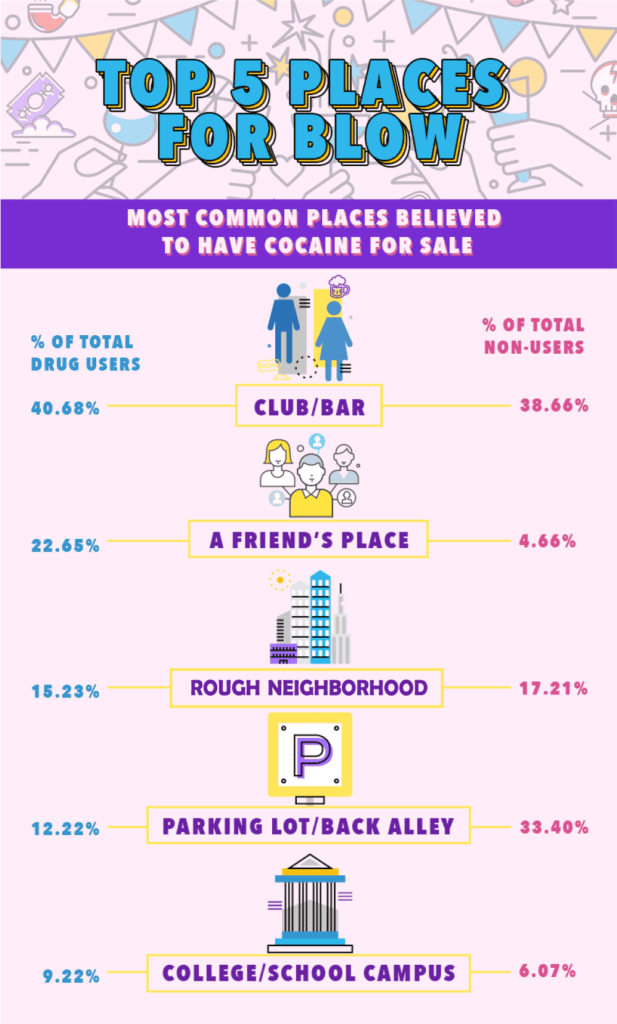
Not So Common Crack
Both users and non-users we surveyed agreed on where they thought the most common place cocaine was available for sale. Bars and clubs, with their dark corners and loud music, earned the largest share of votes. There are several documented arrests associated with dealers operating their illicit business next to the dance floor including one from Orlando, Florida where three people were arrested and almost 900 grams (nearly two pounds) were seized in the process.
Perhaps due to hanging out in different circles, users and non-users disagreed on the second-most-likely location. While over 30 percent of non-users expected a parking lot or back alley, users told us it was a friend’s home instead that was the place to go. And even though colleges and school campuses were rated the lowest overall, recent studies have shown over 35 percent of college students in the United States have been offered cocaine; 13 percent have tried it.
“Studying” Addiction
There are large overlaps of states across the country – California, Florida, New York, Texas – where users and non-users share the same belief about Americans taking the stimulant Adderall: they’re believed to be addicted. Whether prescribed by a physician for legitimate Attention Deficit Hyperactivity Disorder, or purchased illicitly, the drug does boast extreme side-effects such as hallucinations, suicide, and even sudden death. There’s also an increased risk to the latter group, the looming threat of unnecessary dependency or addiction on the drug.
Known as the “study drug,” Adderall has a reputation for helping students who are cramming for tests or exams to make it through long nights and challenging classes. Users and non-users alike in Massachusetts and Nebraska believe those who take Adderall use it to aid concentration. Non-users who think people take Adderall to feel good and forget their problems (a common opinion in Kentucky, Michigan, and Virginia) may be onto something. Those with no medical need to use Adderall experience a rush similar to taking other illicit drugs thanks to a flood of dopamine (the “feel good chemical”) in the brain.
Deal Or No Deal
We discovered it was non-drug users themselves, not users, who were the toughest critics of people experiencing addiction. Over 20 percent of non-users believe addiction is a sign of low or no morals, compared to just under 14 percent of drug users. Perhaps this is due to both groups believing addiction isn’t a choice. According to Dr. Nora Volkow, on behalf of the National Institute on Drug Abuse, “psychiatry recognizes addiction as a disease of the brain, and why professional intervention is needed to treat it in most instances.”
She also suggests that while the first “free choice” to try a substance may be just that, subsequent use diminishes the brain’s ability to break away. Likewise, the American Society of Addiction Medicine notes substance abuse and addiction may lead to many unwanted consequences, such as disability or premature death. Understanding the biological connection behind addiction, and relapse, could lead to more empathy and create an environment where those afflicted would be more comfortable seeking out professional help.
Gender Warfare
When it comes to the gender difference, attitudes toward relapse among women participants were viewed as less harshly than men by both drug users and non-drug users. This went in opposition of the feelings of some women, who share they feel they are judged more harshly by society for relapsing. Over 86 percent of female drug users believed it wasn’t a sign of failure for a user to relapse, compared to almost 74 percent of the non-users who felt the same way.
Men who didn’t use drugs were the toughest critics of the bunch when it came to assessing feelings towards a relapse. We found more than 1 in 4 men who used drugs said they thought to relapse after recovery was a sign of failure, compared to more than 1 in 3 men who identified as non-users. Given their contrast, our study showed male drug users were almost twice as likely to project these negative emotions on a person experiencing regression on their path towards sobriety than female users.
Gone Trippin’
Three of the four groups – male and female non-users and female users – all ranked having fun as the number one reason why someone would use hallucinogens like LSD. Only male users went with a different number one: increasing creativity and intelligence. LSD, in particular, was praised by several male creatives, such as the author Aldous Huxley, author of “Brave New World,” who commented on its’ ability to evoke “cosmic consciousness.”
Non-users didn’t see creativity as a benefit of hallucinogens, as it rated as a middle choice for both men and women. One of the most recent studies on LSD found taking the drug may not necessarily lead to the boost in creativity that some are seeking; participants found it hard to produce the right word when shown a picture.
Knowing What To Think
In several scenarios, non-users and users are thinking along the same line. What tends to vary is how strongly they feel about certain topics. Whether it’s about the safety of weed, the conversation around addiction, or why someone would use Adderall, there is more in common between these groups than differences.
What should never become a difference, however, is how users and non-users approach the idea of substance abuse treatment. Medical professionals are an essential part of structuring the appropriate rehab plan to ensure a return to normal health and normal life.
If you or someone you love is suffering from drug addiction or mental illness, FHE Health experience is here to help you on the road to recovery. Including inpatient and outpatient care as well as medical detox, our team of neuroscientists will help identify the exact parts of the brain impacted by addiction to creating a truly personalized treatment plan. Take control of your life again with the help you need to overcome addiction today. Visit us online today at FHERehab.com to learn more.
Methodology:
We surveyed 1,115 Americans (547 non-drug users and 568 drug users) and asked about their attitudes toward different types of drugs, employing a non-randomized convenience sampling design for the selection of participants. Demographics for non-drug users were from ages 18 to 75 years, self-reporting gender at 63.07% for females and 36.93% for males. All these participants resided in the U.S., with representation from all states and the District of Columbia, except for South Dakota. Highest education levels were represented at 11.52% graduating high school, 31.26% for some college, 38.57% graduating college, 13.71% completing graduate school, 4.2% completing some graduate school, and 0.73% completing some high school. Demographics for drug users were from ages 17 to 74 years, self-reporting gender at 50.18% for females and 49.82% for males. All these participants resided in the U.S., with representation from all states and the District of Columbia, except for Hawaii, Alaska, and Wyoming. Highest education levels were represented at 14.79% graduating high school, 40.85% for some college, 29.75% graduating college, 8.8% completing graduate school, 4.05% completing some graduate school, and 1.76% completing some high-school.
Want to use our study?
Please feel free! All that we ask is that you include a link back to this page so readers can learn more about the study.
Sources
- https://www.drugabuse.gov/about-nida/noras-blog/2014/02/addiction-free-choice
- https://www.asam.org/resources/definition-of-addiction’
- https://www.dailyhelmsman.com/news/over-a-quarter-of-college-students-are-offered-cocaine-study/article_a135080c-9f0f-11e7-99d8-a7446925a267.html
- https://www.wftv.com/news/local/3-arrested-in-drug-ring-targeting-orlando-nightclubs-police-say/558790306
- https://www.statesman.com/news/local/owner-austin-nightclubs-associates-face-drug-money-laundering-firearms-charges/B8pDH4znE1xd3W6jw0hp2J/
- https://psychcentral.com/news/2015/06/03/misuse-of-stimulants-and-adhd-drugs-begins-young/85305.html
- https://theconversation.com/the-hefty-price-of-study-drug-misuse-on-college-campuses-59340
- https://books.google.com/books?id=Brb3AgAAQBAJ&pg=PT27&lpg=PT27&dq=men+judged+more+harshly+than+women+for+relapsing&source=bl&ots=hyT4uvHGVb&sig=Auu7tw9PVYQjJEco6IDjQgOzPVM&hl=en&sa=X&ved=0ahUKEwiDmJyX7vXXAhWE6YMKHQzUCOEQ6AEILjAA#v=onepage&q=men%20judged%20more%20harshly%20than%20women%20for%20relapsing&f=false
- https://www.newsweek.com/government-safety-standards-weed-424780
- https://www.camh.ca/en/education/about/camh_publications/Documents/Flat_PDFs/dyk_lsd.pdf
- https://time.com/4463136/lsd-research-creativity-depression/
